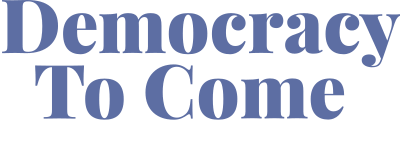
I have long admired the work of Alexis De Tocqueville. It was one of the first books as an undergraduate that genuinely excited me on reading. It was like coming across a diary of a man in the midst of a revolution – not of the obvious kind in the sense of John Reed’s Ten Days that shook the World, which I also adored. Tocqueville was in the midst of something much more intangible and unknowable – it wasn’t a revolution in which the people had a collective idea about what they wanted, it was ongoing. It was messier and harder to grasp and which is why I think his account of it is all the more fantastic. It was a book about the birth of a democracy in which people (for lack of government) self organized for much of the time –often around capital – to build bridges, create railways, or to create other wonderful things. The article I link here is a joint effort with my friend and colleague Prof. Daniel King(Nottingham Trent Uni.) that cross pollinates both of our research interests in an interesting an hopefully productive way. Daniel has a history of writing about non profits and I have a history in political theory (my PhD being in that area). A while back we got to thinking about why so many nonprofits had such ethical aims externally (to reduce child poverty, reduce climate change, help the aged etc) that reflected a wider democratic movement (around social justice) but internally they still seemed to be quite the opposite. Regular news stories around abuses of power (here, hereand here) within non profits suggested that these organizations were being led in a manner antithetical to the values they (and many of their fantastic workers) espouse.

So we decided to write about ways in which nonprofits might justify democracy at work as a way of organizing internally to stop these abuses whilst acknowledging issues that might stand in the way. We asked: how might a CEO argue ethically against giving workers more power in deciding policy given the fact they were ethically committed to empowering the poor, the elderly, the young etc? It was a fun paper to write and began a collaborative journey of writing with Daniel that will be reflected in other posts on the site – it is always a pleasure to find someone who challenges you whilst complimenting what you do to produce something readable, fun and thought provoking!

The Abstract for the paper now published in Nonprofit Voluntary Sector Quarterly (and available in the publications section) is as follows:
Nonprofit organizations are often claimed to be schools of democracy: “that produce citizens able and ready to participate in society” (Dodge & Ospina, 2016, p. 479). This claim is predicated the external role nonprofits play in producing democracy, particularly by engendering civic action. In contrast, this paper promotes nonprofits internal organizing processes to produce democracy within nonprofits themselves. Drawing on the workplace democracy literature, we explore three main justifications for workplace democracy: consequentialist, deontological, and virtue ethics. Rather than viewing workplace democracy as an extrinsic good – based solely on consequences external to the organization – we argue that it should be considered an intrinsic good, valuable in and of itself. We therefore argue for a broadened imaginary for how nonprofits are managed, that include the internal organizational processes and widening of the social mission of nonprofit organization for greater democracy and freedom, based on good work.
To read the paper, please go to the publications section of the site!





